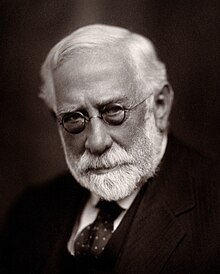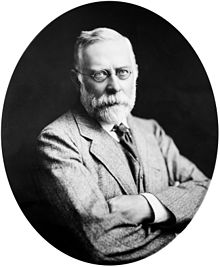| This article's lead section may be too short to adequately summarize the key points. Please consider expanding the lead to provide an accessible overview of all important aspects of the article. (May 2023) |
| Sir Thomas Barlow, 1st Baronet | |
|---|---|
 |
Sir Thomas Barlow, 1st Baronet, KCVO, FRS, FRCP (4 November 1845 – 12 January 1945) was a British royal physician, known for his research on infantile scurvy.
Early life


Barlow was the son of a Lancashire cotton manufacturer and Mayor of Bolton, James Barlow (1821–1887). The family were well known as philanthropists in their home village of Edgworth, Lancashire where they funded charities connected with the Methodist church including the Children's Home.
He studied as an undergraduate at Manchester and London. University College London (UCL) Bachelor of Medicine (BM) in 1873 and Doctor of Medicine (MD) 1874.
Career
He became a registrar at Great Ormond Street Hospital, and later a physician and in 1899 a consultant. He was professor at the UCL from 1895 to 1907, initially of paediatrics and later of clinical medicine.
In 1883, he showed that infantile scurvy was identical with adult scurvy. Barlow's disease – infantile scurvy – is named after him.
He was Royal Physician to Queen Victoria and attended her on her death, and to Edward VII and King George V. He was knighted as a Knight Commander of the Royal Victorian Order in March 1901, and in February 1902 he was created a Baronet, of Wimpole Street in St Marylebone in the County of London. He was President of the Royal College of Physicians from 1910–1914 and delivered their Harveian Oration in 1916 on the subject of Harvey, The Man and the Physician. He was elected a Foreign Honorary Member of the American Academy of Arts and Sciences in 1918.
Barlow received the honorary degree Doctor of Science (D.Sc.) from the Victoria University of Manchester in February 1902, in connection with the 50th jubilee celebrations of the establishment of the university. In 1904, he was listed honorary medical staff at King Edward VII's Hospital for Officers.
Marriage and children
Barlow married Ada Helen Dalmahoy, daughter of Patrick Dalmahoy WS, on 28 December 1880. They had the following children:
- Sir James Alan Noel Barlow, 2nd Bt. (1881–1968), who married Emma Nora Darwin, the granddaughter of Charles Darwin (see Darwin — Wedgwood family).
- Sir Thomas Dalmahoy Barlow (1883–1964)
- Patrick Basil Barlow (23 October 1884 – 18 January 1917), killed in the First World War
- Helen Alice Dorothy Barlow (4 May 1887 – 16 September 1975), died unmarried - see Re Barlow's Will Trusts. With her father, she was a member of the London Survey Committee, a voluntary organisation publishing architectural surveys of the capital.
- Gertrude Mary Barlow (August 1888 – 22 July 1889), died in infancy
Death and legacy
He died 12 January 1945 at 10 Wimpole Street, London aged 99. Barlow's papers are preserved in the archive of the Wellcome Library.
References
- Elliott, T. R. (1945). "Thomas Barlow. 1845-1945". Obituary Notices of Fellows of the Royal Society. 5 (14): 158–167. doi:10.1098/rsbm.1945.0010. S2CID 162240383.
- Carpenter, Kenneth J. (1988). The History of Scurvy and Vitamin C. Cambridge University Press. p. 172. ISBN 0-521-34773-4.
- "No. 27292". The London Gazette. 8 March 1901. p. 1647.
- "No. 27409". The London Gazette. 21 February 1902. p. 1118.
- "Book of Members, 1780–2010: Chapter B" (PDF). American Academy of Arts and Sciences. Retrieved 17 May 2011.
- "University intelligence". The Times. No. 36704. London. 1 March 1902. p. 12.
- "List of Honorary Medical Staff of the Hospital". King Edward VII's Hospital for Officers (Sister Agnes). Historical Record 1899-1969 (3rd ed.). London: Beaumont House. 1969. pp. 20–21.
- CWGC :: Casualty Details at www.cwgc.org
- "Members of the Survey Committee Pages 4-7 Survey of London Monograph 12". British History Online. Guild & School of Handicraft, London, 1926. Retrieved 27 February 2024.
- Medical Press. 1945. pp. 96, 110.
- Harvard Alumni Bulletin - Volume 47, Issue 13 - Page 416
- ^ "Barlow, Sir Thomas (1845-1945)". Wellcome Library Western Manuscripts and Archives catalogue. Wellcome Library. Retrieved 31 May 2011.
External links
- Sir Thomas Barlow at UCL
- AIM25: Wellcome Library: Barlow, Sir Thomas (1845–1945) at www.aim25.ac.uk
- Biography
| Academic offices | ||
|---|---|---|
| Preceded byRichard Douglas Powell | President of the Royal College of Physicians 1910–1914 |
Succeeded bySir Frederick Taylor |
| Baronetage of the United Kingdom | ||
| New creation | Baronet (of Wimpole Street) 1902–1945 |
Succeeded byJames Alan Barlow |
- 1845 births
- 1945 deaths
- 19th-century English medical doctors
- 20th-century English medical doctors
- Academics of University College London
- Alumni of University College London
- Barlow baronets
- British paediatricians
- Fellows of the American Academy of Arts and Sciences
- Fellows of the Royal College of Physicians
- Fellows of the Royal Society
- Knights Commander of the Royal Victorian Order
- People from Edgworth
- Honorary medical staff at King Edward VII's Hospital for Officers